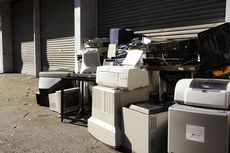The Victorian Government has banned electronic waste (or e-waste) in landfills from July 2019.
E-waste basically includes everything with a plug or battery, from TVs, computers and mobile phones to batteries, power tools and kitchen appliances. The move to ban these items from landfill is one Planet Ark wholeheartedly supports, with e-waste currently growing at a rate three times faster than any other waste stream in Australia.
Product stewardship recycling schemes currently exist nationally for the recycling of computers, televisions, mobile phones and printer cartridges. There is currently no national scheme in place for other electrical appliances.
You can view the options for various e-waste materials at our electrical equipment page.
Otherwise you can keep these items in a safe, dry place until a recycling scheme is put in place.
What happens to e-waste?
E-waste collected for recycling is almost always manually disassembled and assorted into its various components. These individual materials such as cabling, circuit boards, glass, metals and plastics are then processed for use as raw materials in new products.
- Computers and accessories can often be refurbished and made available to lower-income communities. If this is not an option, individual materials such as cabling, glass, circuit boards and plastics are recovered and processed into raw materials.
- Mobile phones are disassembled into component parts, which are then transported to local and overseas recyclers for processing. The plastic can be made into shipping pallets and lithium extracted from the phones can be made into new batteries.
- Whitegoods such as fridges and washing machines have hazardous materials removed before being crushed and shredded for recycling.
- Electrical appliances including DVD players, alarm clocks, cameras, toasters and radios could be repaired at reuse centres.
- Batteries and other electrical equipment components are complex and can be a complicated process due to the chemistry involved.
These are many uses for recycled e-waste materials. More innovative solutions such as using materials from recycled printer cartridges as a component in road surfacing are already on the market.
More information
More information can be found on the Sustainability Victoria website.


